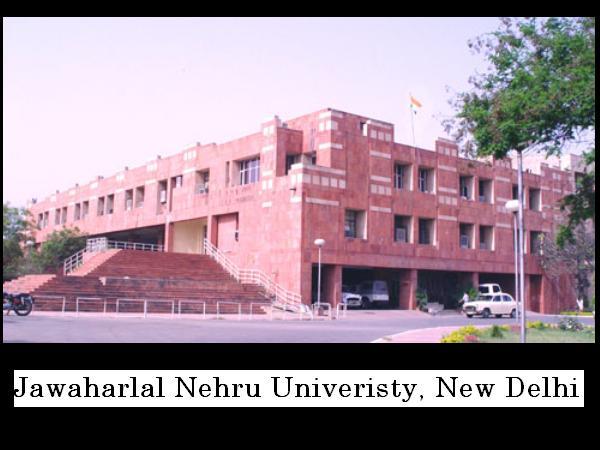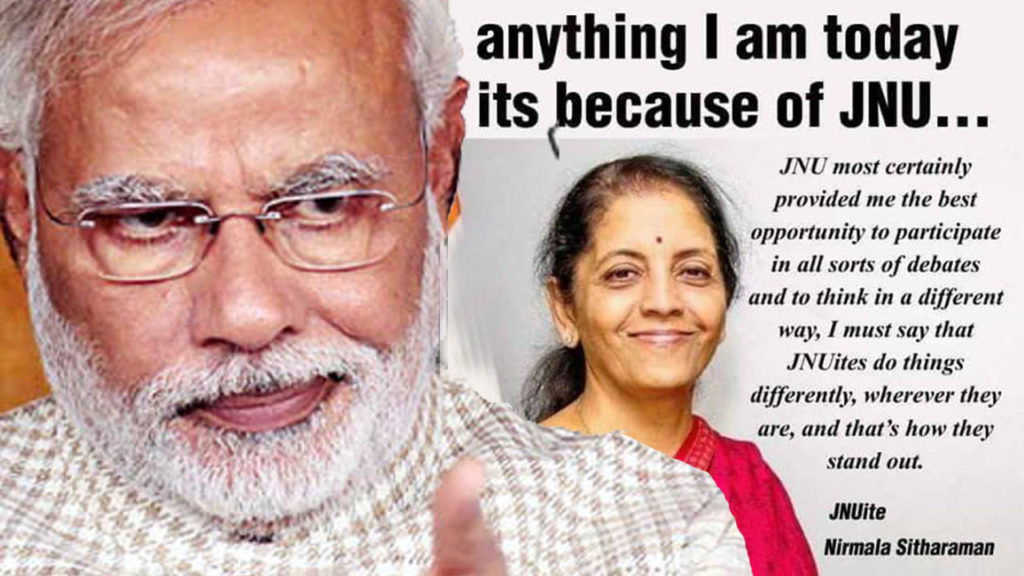JNU – A University Known To Outsiders For Everything That’s Wrong…But Not Every JNUiite is a Kanhaiya or Umar Khalid!


Being in the academia, it’s quite interesting to read different opinion pieces that are written by people from different professional backgrounds on New Delhi’s prestigious Jawaharlal Nehru University (JNU). It is a place which has produced some of the best talents in this country but also infamously known for trouble-mongers like Umar Khalid who was recently arrested under UAPA for his role in the anti-CAA riots in Delhi. Well, a bit of a recap before what I would like to narrate in my essay.
It all began on the cold winter night of February 9, 2016 when an official “cultural event” titled The Country Without a Post Office was organised in the JNU campus against the hanging of Afzal Guru, a Kashmiri terrorist convicted for his attack on the Indian Parliament on December 13, 2001 and later hanged on February 13, 2013. It was led by the then President of Jawaharlal Nehru University Students’ Union (JNUSU) Kanhaiya Kumar, supported by Umar Khalid, Anirban Bhattacharyya, Shehla Rashid and other leaders of Leftist parties sympathetic to the Naxal cause. Kanhaiya Kumar was arrested on February 11, 2016 on the charges of sedition.
Most of us residing in the campus at that time were completely unaware of the “cultural event”. We only came to know about the same after a WhatsApp video of a group of students in our own campus itself shouting “Afzal hum sharminda hain, tere qatil zinda hain”; “Tum kitne Afzal maaroge? Har ghar se Afzal niklega”; “Bharat tere tukde honge..Inshaallah, Inshaallah”; “Hum leke rahenge Aazadi”, went viral on social media! People who were never a part of the dirty politics of the Left but came to JNU to study, to get their degrees and serve their country were aghast at the situation that gradually began to unfold in the campus. Starting from the row at FTII, Pune to the suicide of a PhD candidate at the Hyderabad Central University (HCU), the high-octane drama of Left sloganeering seemed to have had all culminated in JNU.
Overnight, sympathies began to pour in for Kanhaiya, Umar and Anirban. Posters were there everywhere from the hostel mess to the washrooms, demanding the immediate release of these “student leaders”. PM Narendra Modi came to be branded as the demon who was utilising all means available at his disposal to disrepute and discredit democracy, freedom of speech and expression and the constitution itself. Indeed, the Left parties in JNU have always projected themselves as the messiahs of freedom of speech and expression, but whenever it comes to questioning their ridiculously one-sided narrative, one is being labelled as a ‘Sanghi’/‘Bhakt’/‘Fascist! Once when Yoga Guru Swami Ramdev was supposed to visit JNU to deliver a lecture, these same Left parties who swear by ‘freedom of speech and expression’ protested against the invite, calling it a “silent right-wing onslaught”.
During the Kanhaiya row too, these same narratives began to be heard everywhere in the campus. Whatever happened in February-March 2016 was supposed to happen someday or the other in JNU. The Left here has always exercised a tight mafia-like grip in almost every other sphere, right from appointments in teaching positions to silencing every single voice that raises genuine concerns about their modus-operandi. With the coming of the Modi government to power and the subsequent cracking down on several foreign-funded NGOs in the country, the Left began to feel the heat. But, the manner in which things turned out became too sad and embarrassing at the same time, especially for those students in JNU who had nothing to do with this sinister agenda of the Left.
All of a sudden, entire JNU came to be depicted as a place where as if all the students were Maoist sympathisers, and also a place where alcohol and sex are freely available. In fact, one BJP MLA from Ramgarh in Rajasthan’s Alwar district, went on record to state that “JNU is a hub of sex and drugs where more than 10,000 cigarette butts, over 3,000 used condoms and 2,000 liquor bottles are daily found”! There is no denying the fact that there are certain rogue elements in the campus, hell-bent on creating chaos, chaos and only chaos. Unfortunately, they are quite an influential lot too with close links to the higher-ups in the faculty who glorify the ideas of Kraanti/Revolution as the only way to save India from the clutches of capitalism. But then, to defame an entire university as a zone of drugs and sex and all its students as “anti-nationals” is not a healthy way of addressing the genuine problems that afflict this university.

Anti-nationals like Umar Khalid deserve all the public vilification, whether it be for his alleged role in the assassination plan of PM Modi Ji or in the Delhi riots that took place in January 2020 against the CAA. These people are a blot in the name of “student leaders”. They are an embodiment of shame and disgrace in the guise of a “PhD research scholar”. But, JNU is not just about Kanhaiya Kumar or Umar Khalid. It is as much about a Nirmala Sitharaman and S. Jaishankar as it is about an Amitabh Kant or IPS Sanjukta Parashar who once used to be known as the terror-lady among Assam’s NDFB militants. Unfortunately, it is only the ugly picture of JNU that most often gets all the attention from the TRP-crazy media houses!

It is the same JNU which honoured an illiterate village-dweller from Assam – Jadav Payeng – as the “Forest Man of India” for his unparalleled role in environmental conservation in a flood-prone area along the mighty Brahmaputra. Majority of the people in this country might still be unaware of this man from a non-descript village in Assam who single-handedly converted an entirely washed-out land into a 1,360 acre forest. As the then Vice-Chancellor of JNU, Prof. Sudhir K. Sopory had rightly remarked, “True nature lovers do not spend their time attending lectures and conferences; they are found in the field.” True words indeed! From the man himself at the helm of a university known for all the wrong reasons, but one which recognised the genuine efforts of somebody from NE India when no one else in the country did.
On several occasions, people have raised questions regarding the long-term utility and societal benefits that are actually accrued from the PhD degrees earned by students in JNU. Those PhD theses that seem to be heavily influenced by only a certain ideological underpinning are definitely questionable, and must be questioned too. But, this should not amount to denigration of all the doctoral fellows in the university as people who are surviving on public money while whining away all their time in mindless political sloganeering. Not all in JNU are a part of the larger designs of the Left. There are scholars who genuinely want to do some real ground-level study in the future after the completion of their PhD’s, and thus make the maximum utilisation of their PhD years to delve further deep into the subject.
There might definitely be a problem when it comes to the quality and content of a majority of the PhD theses that are produced each year from all universities across the country, both state and central, and not just JNU. In this respect, fingers need to be pointed at all the universities and the quality of their PhDs rather than targeting just only one. The real fault here lies in India’s failed education system which does not have a rigorous screening mechanism to test students who really have an aptitude for research to step into a physically and mentally draining phase of a PhD. It is a process that needs a lot of thinking and then putting these thoughts into words, combined with minutely detailed field-studies that require incorporation in each and every stage of writing of the thesis so as to make it authentic. Not every job can be everyone’s cup of tea. The same holds true for research too.
Definitely, lots things have to be changed in the social science departments of JNU. If the narrative has to be changed, we need to promote some real ground-breaking research in the social sciences that is brutally honest but at the same time, devoid of any ideological moorings. The current VC of the university Prof. Mamidala Jagdeesh Kumar is trying as best as he can to rectify the past wrongs, from conducting conferences on Vedic Mathematics and its relevance in the area of social science research to organising a webinar series on “Leadership Lessons Through the Ramayana” during the current lockdown period. Truly, a much-needed, but quite gradual change.
In the fields of pure science too, JNU has established a name for itself in many areas that have always been either ignored or overlooked by an agenda-propelling media. E.g. in the year 2017, researchers at the School of Life Sciences (SLS) and Special Center for Molecular Medicine at JNU had discovered an anti-arthritis drug called diflunisal that can be effectively used to kill Helicobacter Pylori, a bacterium responsible for causing stomach-related ailments ranging from chronic gastritis and ulcers to pancreatic cancer. The researchers at JNU had made the discovery about the use of this drug while investigating a protein called beta-clamp in the bacterium which is a crucial target for drugs. In the very next year, in 2018, Professor Ashwani Pareek of JNU was awarded with the Visitor’s Award for Technology Development by the President of India for developing a stress-free variety of rice that can withstand several ecological and non-ecological hurdles in its cultivation, thereby enhancing the income of poor farmers.

In yet another recent finding, a team of biologists from JNU and Shiv Nadar University led by Dr. Anand Ranganathan of JNU had broken fresh ground in crushing the malaria parasite before it can take refuge in the RBCs of the human body and multiply. Although the discovery is still in its infant stages, their research offers innumerable options to improve the effectiveness of existing medicines such as chloroquine and artemisinin since the parasites are building resistance to these drugs.
In fact, JNU has always been a cradle of breakthrough scientific research. Sadly, some of its top-class scientists who have been working hard silently without vying for unnecessary publicity or media glare, have failed to find their rightful space in the overall “intellectual” discourse of the university that is overtly Left-leaning. It is because any kind of scientific and development discourse works like an antidote to the Left’s devilish brand of politics based on a destructive, anti-human ideology.
It is easy to jump on to one’s guns and generalise things about a place that has been known more for its political volatility but less for its achievements. A victory march for Umar Khalid was organised in JNU on the very same night when writer-director Vivek Agnihotri’s ‘Buddha In A Traffic Jam’ was screened outside the admin block in the open after the authorities cancelled the bookings of the auditorium in the very last moment. It was after this cancellation that there was an amazing response from the common students of JNU who wanted to watch the movie at any cost, unapologetically. While on the one hand, the area near the admin block echoed with the angry slogans of “Agnihotri wapas jao….Sanghi wapas jao….”, the chanting of ‘Vande Mataram’ and ‘Bharat Mata ki Jai’ filled the atmosphere on the other. It was a historic moment! The tide was gradually beginning to change.
A Kanhaiya Kumar or an Umar Khalid may represent the aspirations of hardly a few thousand students at JNU, but quite adept at silencing all other voices of dissent in the campus. But, to identify an entire university with the likes of these is an insult to the rest of the students here who want real Azaadi – from pseudo-intellectualism, sycophancy and favouritism. JNU needs to be given its due credit where it rightly deserves.
Jai Hind!
References:
DISCLAIMER: The author is solely responsible for the views expressed in this article. The author carries the responsibility for citing and/or licensing of images utilized within the text.
